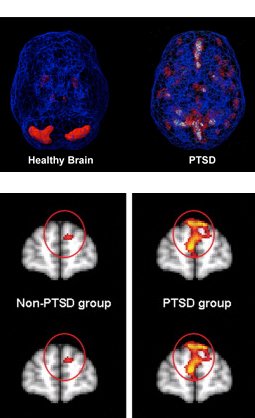Are You Neurodivergent or a Trauma Survivor? Why Neurofeedback Helps Both
At our Sydney Neurofeedback Center, we often work with clients who present with ADHD diagnosis, yet they developed symptoms later in life, as a result of traumatic events.
The truth is, both trauma and ADHD can impact the brain and body in similar ways.
The brain of someone who has experienced trauma is chemically and physiologically different from the brain of someone who hasn’t. This is why those with PTSD and Complex PTSD (cPTSD) are considered Acquired Neurodivergent. Unlike innate neurodivergence (such as ADHD or autism), PTSD and cPTSD develop as a physiological response to overwhelming experiences.
Whether your neurodiversity is Innate or Acquired, understanding how trauma reshapes the brain and body is key to finding effective support.
How Trauma Changes the Brain
Trauma doesn’t just leave memories - it changes the wiring, chemistry, and function of the brain, and it’s stored in the body as well.
Key effects of trauma include:
Amygdala Overactivation: This “alarm center” can become hyperactive, leading to anxiety, hypervigilance, irritability, and strong emotional reactions to everyday stressors.
Hippocampus Disruption: Trauma can distort memory and learning, causing flashbacks, intrusive memories, and difficulty concentrating.
Prefrontal Cortex Shutdown: The brain’s regulation and decision-making center can become less effective, resulting in impulsivity, brain fog, and difficulty planning.
Neurochemical Imbalances: Stress hormones like cortisol and adrenaline, and neurotransmitters such as dopamine and serotonin, can be disrupted, contributing to mood swings, sleep issues, and anxiety.
Nervous System Dysregulation: Trauma shifts the autonomic nervous system toward chronic fight-or-flight or freeze states, keeping the body and brain in survival mode.
Trauma in the Body: Trauma is stored physically, showing up as chronic tension, shallow breathing, fatigue, digestive issues, or unexplained pain. Stress or emotional triggers can reactivate these patterns.
These combined effects make trauma a whole-body imprint, affecting how you process emotions, information, and relationships.
Because of these changes, people living with PTSD or cPTSD often experience symptoms such as:
Brain fog and poor focus and concentration
Mood swings and irritability
Difficulty switching tasks
Impatience and impulsivity
Challenges regulating emotions
Difficulty making decisions
Heightened anxiety
These symptoms mirror many of the traits we associate with neurodiversity and in particular ADHD.
Innate vs Acquired Neurodiversity
Whether your neurodiversity is innate (like ADHD or autism) or acquired (like PTSD and CPTSD), the impact on daily life can be similar: struggles with focus, regulation, and resilience. The key difference is that one is present from birth, while the other develops as a response to overwhelming experiences.
Why Dynamical Neurofeedback® Helps Acquired Neurodiversity
At our Executive Brain Mastery Neurofeedback Centre in Sydney, we specialize in Dynamical Neurofeedback®, a non-invasive, brain-based approach that helps the brain and body self-regulate naturally.
How it works:
Supporting the Brain
Real-time feedback helps the brain balance key regions, effectively calming the amygdala, restoring prefrontal cortex function, and improving hippocampus regulation. This supports attention, memory, emotional regulation, and decision-making.Regulating the Nervous System
Neurofeedback retrains autonomic patterns, reducing fight-or-flight or freeze responses and promoting a sense of calm and stability.Supporting the Body
By stabilizing the nervous system, neurofeedback helps the body release tension, normalize breathing, and reduce physiological stress, supporting overall well-being.Flexible and Gentle
It does not require you to relive or talk through traumatic events, it works without forcing traumatic memories to surface and adapts to your current brain state. This makes it suitable for trauma survivors and neurodivergent individuals alike.Long-Term Benefits
Over time, neurofeedback helps the brain learn new patterns of self-regulation, allowing symptoms to become manageable. The result is improved focus, emotional balance, and resilience, so that neurodiversity - innate or acquired - doesn’t limit your life.
Living Fully Beyond Labels
At the Sydney Neurofeedback Center, we focus on supporting the brain and nervous system rather than labels. Dynamical Neurofeedback® empowers you to regulate emotions, improve focus, and feel present, helping you live fully regardless of whether your challenges come from innate neurodiversity or trauma.
With consistent support, your brain can learn to self-regulate, your body can begin to feel safe again, and you can enjoy clarity, resilience, and freedom in daily life.
If you’re ready to explore how our Neurofeedback Sydney clinic can support your journey, we are here to help guide you toward lasting balance and well-being.

